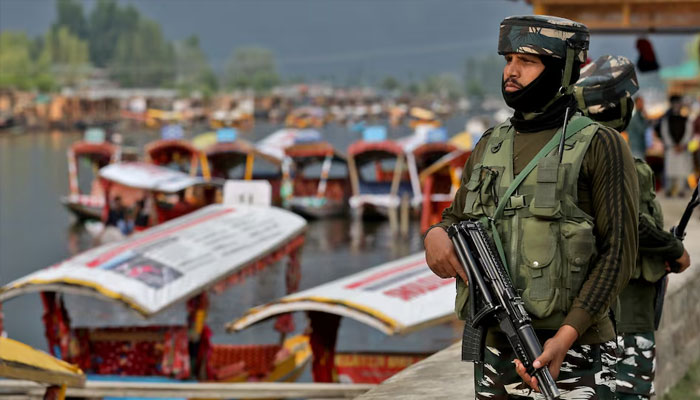India’s hegemonic dreams
India under Modi scrapped Article 370 in Indian Illegally Occupied Jammu and Kashmir (IIOJK) back in 2019
On the occasion of Youm-e-Istehsal-e-Kashmir on August 5, which marks the day when India under Modi scrapped Article 370 in Indian Illegally Occupied Jammu and Kashmir (IIOJK) back in 2019, Prime Minister Shehbaz Sharif emphasized that granting due rights to the people of Occupied Kashmir is the only way to maintain peace and stability in the region. He urged New Delhi to resolve the longstanding dispute via dialogue and said that Pakistan had never thought of aggression with regard to its nuclear power and thus “the better option is to adopt the peaceful way and sit together to find out the peaceful solution to the Kashmir dispute”. It is not surprising that India has not responded to any of Pakistan’s peaceful overtures in the past few years with a positive response. Its response, whenever it has come, has always been negative and with the ‘terror-free environment’ caveat even though there has been no cross-border terrorism from the Pakistani side despite provocation from India, which includes assassinations on our soil.
This Indian provocation has also made it to international media, with The Guardian report in April 2024 an indictment of India’s cross-border terrorist activities in Pakistan. In one way then, India’s response is more about its own guilt rather than anything else. There is no denying that relations between India and Pakistan have almost always been tense but they have not always been hostile despite the Kashmir dispute. However, the Modi regime has changed the dynamics of the Indo-Pak relations. Over the past few years, we have seen India become extremely Pakistan-centric in its approach and it’s not just their government or diplomats but even the Indian media’s analysis has changed.
India somehow has started seeing itself as the ‘big brother’ of this region and looks at everything through a prism where India is in control and has a hold over its neighbouring countries as if they are its proxies. Look at the Sheikh Hasina government’s downfall in Bangladesh and the reaction by India. Even an organic movement in Bangladesh – and the jury is still out on what is in store for its future – is being seen by India solely through a Pakistani lens and how a new government there will benefit Pakistan more than India or how Hasina’s ouster somehow is a setback for India and a gain for Pakistan. It seems India cannot look at anything except how it can strengthen its hold over the region; this is why it finds it difficult to extend an olive branch to Pakistan or any other country unless India’s hegemony is accepted. India under Modi needs to realize that even countries with decades of hostilities cannot fight each other forever – and at the end of the day, they need to sit down and normalize relations through diplomacy. India can try to hold back from this realization due to its arrogance but there are voices from among Indian foreign relations experts that are pointing out how India is fast becoming isolated in the region due to its flawed foreign policy. It would do our ambitious neighbour some good if it came down from its high horse and engaged with its neighbours instead of talking down to them. Regional peace can only be achieved if all countries sit together and resolve their differences.
-
 Noel Gallagher Gives Shut-up Call To Critics After Receiving BRIT Award
Noel Gallagher Gives Shut-up Call To Critics After Receiving BRIT Award -
 Pentagon Used Anthropic’s Claude AI In Iran Attack Despite Ban: Report
Pentagon Used Anthropic’s Claude AI In Iran Attack Despite Ban: Report -
 Nvidia Teams Up With Telecom Firms For AI Driven 6G
Nvidia Teams Up With Telecom Firms For AI Driven 6G -
 SpaceX Launches 25 Starlink Satellites On Its Falcon 9 Booster From The West Coast
SpaceX Launches 25 Starlink Satellites On Its Falcon 9 Booster From The West Coast -
 Expert Reveals What Makes Investigations Hard In Search Of Savannah Guthrie Mother Nancy: 'Silent Witness'
Expert Reveals What Makes Investigations Hard In Search Of Savannah Guthrie Mother Nancy: 'Silent Witness' -
 'SNL's Strongly Reacts To BAFTA's Racial Slur With Tourette’s Sketch
'SNL's Strongly Reacts To BAFTA's Racial Slur With Tourette’s Sketch -
 Austin Shooting Leaves Multiple Dead, Dozens Injured
Austin Shooting Leaves Multiple Dead, Dozens Injured -
 Meghan Markle Friends Break Silence As Duchess Plan To Return To UK
Meghan Markle Friends Break Silence As Duchess Plan To Return To UK -
 Dua Lipa Stuns Everyone On And Off Stage At 2026 BRIT Awards
Dua Lipa Stuns Everyone On And Off Stage At 2026 BRIT Awards -
 2026’s Most Visited Websites Revealed: ChatGPT Overtakes Major Platforms
2026’s Most Visited Websites Revealed: ChatGPT Overtakes Major Platforms -
 Worst Cricket Moments That Shocked The Game
Worst Cricket Moments That Shocked The Game -
 Prince Harry, Meghan Markle Reach A Crossroads: ‘You Could Lose Everything’
Prince Harry, Meghan Markle Reach A Crossroads: ‘You Could Lose Everything’ -
 F1 Title Race: Who Will Win 2026 Drivers’ And Constructors’ Championships?
F1 Title Race: Who Will Win 2026 Drivers’ And Constructors’ Championships? -
 New Observatory Sends 800,000 Asteroid Alerts In One Night
New Observatory Sends 800,000 Asteroid Alerts In One Night -
 Cher’s Son Elijah Blue Allman Apprehended On Two Counts Of Assault At Elite Prep School
Cher’s Son Elijah Blue Allman Apprehended On Two Counts Of Assault At Elite Prep School -
 Beatrice, Eugenie Now Face Andrew, Sarah's ‘nightmares’: 'They're Hugely Conflicted'
Beatrice, Eugenie Now Face Andrew, Sarah's ‘nightmares’: 'They're Hugely Conflicted'




